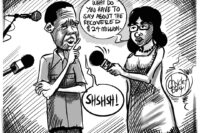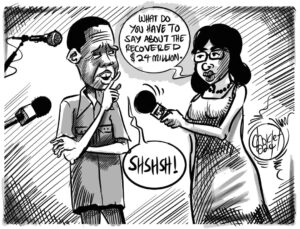Chaisa residents yesterday staged a protest over the continued long hours of load shedding during the day, arguing that they had no use for power which only comes at night.
The residents stoned a Zesco customer service centre and blocked Great North Road before police intervened.
In an interview, Zesco spokesperson Henry Kapata narrated that the residents threatened to burn some Zesco stations in the area because they were frustrated with the load shedding time table.
But Kapata explained that Zesco was load shedding residential areas during the day in order to keep the industries running for the sake of keeping the economy alive.
“Obviously, what is not correct is to resort to stoning customer service and acts of vandalism. I am aware that there was some residents, young ones, stoning customer service and threatening to burn some of the stations around there which is incorrect. The information I have is that they are frustrated that they don’t have power during the day time. But we are saying I am sure that even where you live you don’t have power during the day, it is everywhere!” Kapata exclaimed.
“Load management, like we have said, is that in the day time, we have to save the economy by taking power to the industries because we want people to remain productive. If people leave home and they go to work, where they are working there is no power; it is much more lethal and much more carless for us to give people power [at] home, so there is no productivity there. So you have noticed that much of load management is done in the day time whereby the industry will have power, where you will go for work, you find power and when you get back in the evening power gets back when you are back home. It’s part of load management so that we save the industry from total collapse.”
Kapata said maximization of usage whenever power was restored caused fuses to trip, thereby worsening load shedding.
“Those are areas that there is a high rampage of vandalism of cables, siphoning of transformer oil and it is like we are now sick and tired of talking about them all the time. You find that fuses are burning as a result of overloading in the system. When power is restored, everybody maximizes the usage of electricity in the end you have fuses that are burnt because in other words the transformer is communicating that ‘I can’t handle it anymore there are so many rods coming to me; so I will have to trip so that I save myself from further damage’. So those are the things that we have always engaged our friends there. When we call for a meeting, they don’t come! They don’t come to listen to these issues of load management. That is one area Chaisa, Mandevu, Marapodi where people don’t want to listen to us,” he lamented.
He warned that there were serious consequences for vandalism.
“The language obviously is that vandalism or committing an offence whether juvenile or adults has its own consequences. Even if juveniles are taken differently and the approach is different but it is the same consequences. The advice will always be that ‘people, please, whenever there are grievances first of all, they have to inquire what is happening if they are not registered with Zesco Limited’, we have always communicated with our clients that if we are not coming back from supply at that time, it is because of such and such,” Kapata said.
Meanwhile, Kapata said some customers may experience longer hours of load shedding because Zesco utilises the time to carry out maintenance works.
“If there are issues to do with load management, we have always continued to sensitise the people and we have always encouraged them to get registered with Zesco limited whenever we had faults. Sometimes, we carry out maintenance works whenever we having this long hours of load management. It is an opportunity for us when we have load management to do some of the distribution works that we are doing,” said Kapata.
“Remember that we also doing some poles the 132KV, the poles single circuit we are replacing them with the double circuit. So there are a lot of works that we do during load management; so sometimes [power] may not come as normal because these are the works we are doing.”












2 Responses
Henry should not be insulting people like that. Does he know that there are more people in the informal sector than the formal one, thereby making sacrificing the small scale entrepreneurs in the person of welders, hairdressers…. immoral and unjust, so as to sustain the industries that do not cater for as much people. Moreover, the industries have the capacity to source for alternative sources of power as ZB has demonstrated.
If an infrastructure does not serve the people Henry should not expect the people to protect the same. Henry should rather talk of the incompetence at ZESCO that has seen the organisation incapable of projecting issue of the future.
Climate Change did not occur this year. It is is a gradual deterioration in which the government and ZESCO were long warned to put in place measure. It is sad that in Zambia, it is the most incompetent people who have the task of running the country. The MMD was bad, but the evil of MMD ni manyengwe, when viewed in light of the evil of the christian oriented PF.
There is a president who is donating huge sums of money to churches who in turn unashamedly receive it and thank their gods when the same money could be channelled to institutions like UNZA for research that will be beneficial to the nation. Zambia’s curse is its christian identity for this identity has thrown reason out of the window for the government would rather listen to the hallucinations of men of god than to well researched works by experts.
We’re in trouble as a country.